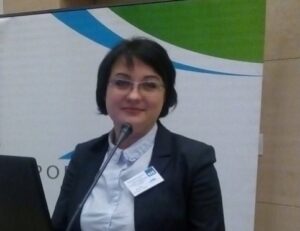Marianna Gladysh is an international relations expert who took part in one of three AABS-hosted panels this spring featuring Ukrainian scholars and their research. Each was recorded and is available for viewing on our YouTube channel. A couple months later, we asked several of those participant scholars to contribute a short piece to our yearly print newsletter, and we now republish those pieces online. Note: these pieces were written in May and June of 2022.
Marianna Gladysh is Associate Professor of the Department of International Relations and Diplomatic Service at the Faculty of International Relations, Ivan Franko National University of Lviv. From 2016–2021 she was the Administrative Coordinator of the Erasmus+ KA 2 project “Rethinking Regional Studies: Baltic and Black Sea Connection (BBSR)” and Coordinator of the MA Programme “Baltic-Black Sea Regional Studies” in English. From 2010 till present time she is Head of the Centre of Northern European countries at Ivan Franko National University of Lviv. Her scientific fields of interest include resilience, Baltic-Black Sea cooperation, foreign and security policy of the Baltic States, and EU-Ukraine relations.

© Marianna Gladysh
On 24 February 2022, my life and that of all Ukrainians changed. The city I live in was not shelled that morning, but the news from other Ukrainian cities was terrifying. We all had to work out what we needed to do — escape or stay, how to go on working and living, and what to expect. As we had been using distance learning before the war broke out, this meant that our students were in the different regions of Ukraine, and the first task for us as lecturers was to find out if they were safe and alive. I contacted the heads of the groups with whom I had classes to ensure that they were ok, and luckily all of them were safe.
I decided to stay in Lviv and help in any way I can. Together with my friends and colleagues, we have been doing volunteer work — helping refugees, collecting and sending humanitarian aid to different cities (Kharkiv, Mykolaiv, and others), talking to journalists (online and in person) to explain what is going on. Having contacts with military personnel, we started collecting money to buy them necessary equipment, which unfortunately they lacked. Such volunteering has also helped me not to follow the news all the time and give me a feeling of living.
The students are our future, and that future will be brilliant and peaceful!
After two weeks, the educational programs at the university restarted and meeting the students online brought real joy. I was extremely happy to see many of them, though not all could join the classes — some were on their way from dangerous places, some were volunteering, others have joined the Ukrainian armed forces. University authorities recommended having a flexible approach towards students in case some, for the aforementioned reasons, could not attend classes but wanted to have individual assignments; lecturers have connected with such students individually.
Regarding my research, at first it was impossible to concentrate on any research work. All my thoughts were focused on the front line and battlefields, but after two or three weeks, I pulled myself together and decided that I have to continue with my research as well. Together with my colleague from Mariupol University, we have decided to prepare an article on Ukrainian information resilience in the face of Russian aggression (national and regional dimensions). The main focus areas of the article are how information resilience in Ukraine was transformed during the two phases of Russian aggression; the role of the state and civil society in this transformation; how the conceptual principles of information resilience are implemented; and, finally, the challenges to information resilience and security during the Russian offensive on Mariupol. We believe that this topic will be interesting for a wide range of readers.
More than three months into the war … life still goes on. We don’t make long-term plans, as anything could happen, but we all believe in the victory of Ukraine and the whole democratic world. I am happy that I can work, that I am alive and that my city is not being shelled constantly. My students also give me great motivation to carry on working. They are our future, and that future will be brilliant and peaceful!
– Marianna Gladysh, 2022
